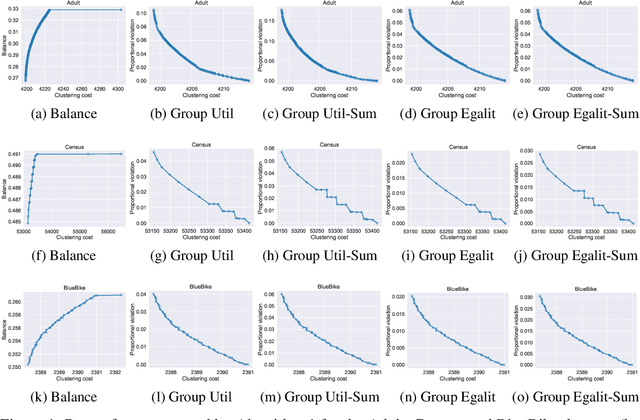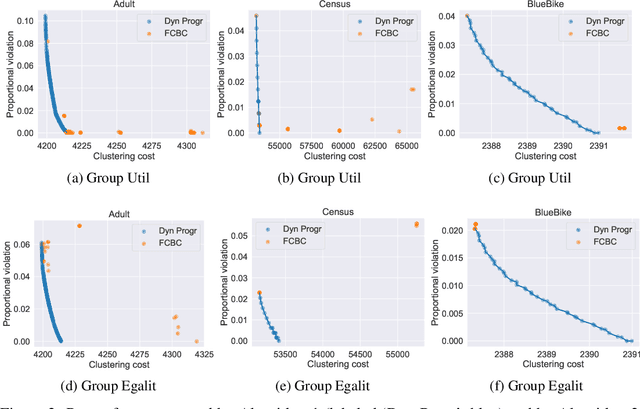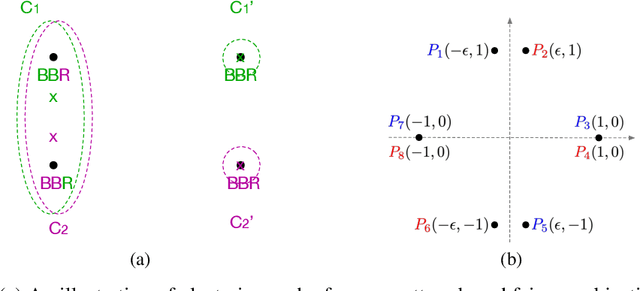Ana-Andreea Stoica
The Fairness-Quality Trade-off in Clustering
Aug 19, 2024



Abstract:Fairness in clustering has been considered extensively in the past; however, the trade-off between the two objectives -- e.g., can we sacrifice just a little in the quality of the clustering to significantly increase fairness, or vice-versa? -- has rarely been addressed. We introduce novel algorithms for tracing the complete trade-off curve, or Pareto front, between quality and fairness in clustering problems; that is, computing all clusterings that are not dominated in both objectives by other clusterings. Unlike previous work that deals with specific objectives for quality and fairness, we deal with all objectives for fairness and quality in two general classes encompassing most of the special cases addressed in previous work. Our algorithm must take exponential time in the worst case as the Pareto front itself can be exponential. Even when the Pareto front is polynomial, our algorithm may take exponential time, and we prove that this is inevitable unless P = NP. However, we also present a new polynomial-time algorithm for computing the entire Pareto front when the cluster centers are fixed, and for perhaps the most natural fairness objective: minimizing the sum, over all clusters, of the imbalance between the two groups in each cluster.
Fairness Rising from the Ranks: HITS and PageRank on Homophilic Networks
Mar 08, 2024Abstract:In this paper, we investigate the conditions under which link analysis algorithms prevent minority groups from reaching high ranking slots. We find that the most common link-based algorithms using centrality metrics, such as PageRank and HITS, can reproduce and even amplify bias against minority groups in networks. Yet, their behavior differs: one one hand, we empirically show that PageRank mirrors the degree distribution for most of the ranking positions and it can equalize representation of minorities among the top ranked nodes; on the other hand, we find that HITS amplifies pre-existing bias in homophilic networks through a novel theoretical analysis, supported by empirical results. We find the root cause of bias amplification in HITS to be the level of homophily present in the network, modeled through an evolving network model with two communities. We illustrate our theoretical analysis on both synthetic and real datasets and we present directions for future work.
Bridging Machine Learning and Mechanism Design towards Algorithmic Fairness
Oct 12, 2020Abstract:Decision-making systems increasingly orchestrate our world: how to intervene on the algorithmic components to build fair and equitable systems is therefore a question of utmost importance; one that is substantially complicated by the context-dependent nature of fairness and discrimination. Modern systems incorporate machine-learned predictions in broader decision-making pipelines, implicating concerns like constrained allocation and strategic behavior that are typically thought of as mechanism design problems. Although both machine learning and mechanism design have individually developed frameworks for addressing issues of fairness and equity, in some complex decision-making systems, neither framework is individually sufficient. In this paper, we develop the position that building fair decision-making systems requires overcoming these limitations which, we argue, are inherent to the individual frameworks of machine learning and mechanism design. Our ultimate objective is to build an encompassing framework that cohesively bridges the individual frameworks. We begin to lay the ground work towards achieving this goal by comparing the perspective each individual discipline takes on fair decision-making, teasing out the lessons each field has taught and can teach the other, and highlighting application domains that require a strong collaboration between these disciplines.
 Add to Chrome
Add to Chrome Add to Firefox
Add to Firefox Add to Edge
Add to Edge